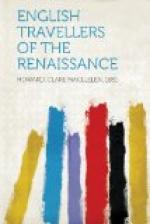Then, too, the scholar diversified his labours by excursions to Venice, in one of those passenger boats which plied daily from Padua, of which was said “that the boat shall bee drowned, when it carries neither Monke, nor Student, nor Curtesan.... the passengers being for the most part of these kinds"[113] and, as Moryson points out, if he did not, by giving offence, receive a dagger in his ribs from a fellow-student, he was likely to have pleasant discourse on the way.[114] Hoby took several trips from Padua to Venice to see such things as the “lustie yong Duke of Ferrandin, well accompanied with noble menn and gentlemen ... running at the ring with faire Turks and cowrsars, being in a maskerie after the Turkishe maner, and on foote casting of eggs into the wyndowes among the ladies full of sweete waters and damaske Poulders,” or like the Latin Quarter students who frequent “La Morgue,” went to view the body of a gentleman slain in a feud, laid out in state in his house—“to be seen of all men."[115] In the outlandish mixture of nations swarming at Venice, a student could spend all day watching mountebanks, and bloody street fights, and processions. In the renowned freedom of that city where “no man marketh anothers dooynges, or meddleth with another mans livyng,"[116] it was no wonder if a young man fresh from an English university and away from those who knew him, was sometimes “enticed by lewd persons:” and, once having lost his innocence, outdid even the students of Padua. For, as Greene says, “as our wits be as ripe as any, so our willes are more ready than they all, to put into effect any of their licentious abuses."[117] Thus arose the famous proverb, “An Englishman Italianate is a devil incarnate.”
Hence the warnings against Circes by even those authors most loud in praise of travel. Lipsius bids his noble pupil beware of Italian women: " ... inter faeminas, formae conspicuae, sed lascivae et procaces."[118] Turler must acknowledge “an auntient complaint made by many that our countrymen usually bring three thinges with them out of Italye: a naughty conscience, an empty purse, and a weak stomache: and many times it chaunceth so indeede.” For since “youth and flourishing yeeres are most commonly employed in traveill, which of their owne course and condicion are inclined unto vice, and much more earnestly imbrace the same if it be enticed thereto,” ... “many a time pleasures make a man not thinke on his returne,” ... but he is caught by the songs of Mermaids, “so to returne home with shame and shame enough."[119]
It was necessary also to warn the traveller against those more harmless sins which we have already mentioned: against an arrogant bearing on his return to his native land, or a vanity which prompted him at all times to show that he had been abroad, and was not like the common herd. Perhaps it was an intellectual affectation of atheism or a cultivated taste for Machiavelli with which he was inclined to startle his old-fashioned




